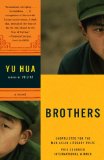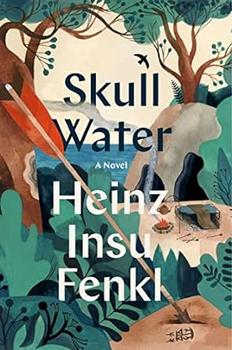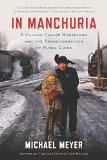Summary | Excerpt | Reviews | Beyond the book | Read-Alikes | Genres & Themes | Author Bio

A Novel
by Yu HuaBrothers, published as one book in English, was originally published in
China as two separate books. The first volume, published in 2005, relates
Baldi Li's and Song Gang's childhoods and early adolescence growing up during
China's Cultural Revolution (see sidebar). While the style is consistent
throughout the novel, the overall tone of the first book is increasingly dark,
with a depth that isn't carried through to the book's second half. A pervasive
sense of impending tragedy imbues much of the narrative. Yu does a remarkable
job of conveying the emotional and physical devastation inflicted on China's
populace as seen through the eyes of its children.
The second book (first published in 2006) picks up when the brothers are young
men and follows their lives throughout the decades that follow. Yu chronicles
China's reaction to and recovery from the deprivations of the Cultural
Revolution. While in the 1960s and 1970s China's citizens were repressed and
permitted no personal freedoms whatsoever, Yu portrays the people of the 1980s
and 1990s gravitating to the other end of the spectrum, overindulging in the
freedoms they'd been denied for so long, and taking those liberties to the
extreme. Emotionally, the tenor of this second section is a great deal lighter,
but its satire is considerably more acerbic. The narrative is frequently
laugh-out-loud funny, often sinking into the ridiculous.
Throughout, Yu's style owes much to Chinese storytelling tradition. There's a
rhythm to the language that makes one feel one is listening to the story, rather
than reading it. Phrases are repeated more often than would be normal in a
traditional novel. For example, at one point Baldi Li asks a group of children
to go wait for someone "like a midnight cat waiting for a midnight mouse." A few
paragraphs later, the author writes, "And so they waited like a midnight cat
waiting for a midnight mouse." The phrase recurs again in the next paragraph.
The sentences are short with a simple vocabulary. It's reminiscent of a
children's bedtime story (with R-rated content).
Other stylistic choices add to the novel's folk-tale atmosphere. Yu's humor is
bawdy and earthy, devoid of subtlety. The plot is action driven, with very
little space taken up with analysis or with fleshing out characters; Baldi Li's
workers are always referred to as the "fourteen loyal minions," never as
"employees" or by individual names. Events are exaggerated to the point that
they become outlandish. Normally this type of narration would quickly become
tedious or strike the reader as silly, but in Yu's hands this approach is quite
effective. He brilliantly takes what appears on the surface to be a simplistic
style and not only gets his political point across, but creates an immensely
entertaining novel in the process.
Brothers will not appeal to everyone. The subject matter is unrelentingly
coarse; there's not a single human bodily function or body part that doesn't get
its fair share of verbiage. The first few pages of the book (excerpted at BookBrowse) relate the story of Baldi Li getting caught looking at women's buttocks at the public latrine, and how his father died when he fell into the cesspit below the toilets while attempting the same action – and that's not nearly as tasteless as some of the other occurrences the author relates in the novel's second half. The text is
liberally sprinkled with obscenities. It is also frequently quite violent.
Readers who are not sensitive to such vulgarities, however, will find a rich
exploration of current Chinese culture and insight into the factors that
influenced the country's evolution to its present state.
About the Author: BookBrowse has a short biography of the author but a
longer profile, together with an early review of Brothers from 2006, can be
found at the
New York Times.
Interesting Links:
![]() This review was originally published in The BookBrowse Review in February 2009, and has been updated for the
January 2010 edition.
Click here to go to this issue.
This review was originally published in The BookBrowse Review in February 2009, and has been updated for the
January 2010 edition.
Click here to go to this issue.

If you liked Brothers, try these:

by Heinz Insu Fenkl
Published 2023
A "mesmerizing" (PW, James McBride) "magnificent" (Ha Jin) intergenerational coming-of-age novel set in South Korea—about friendship, belonging, and displacement.

by Michael Meyer
Published 2016
A combination of memoir, contemporary reporting, and historical research, presenting a unique profile of China's legendary northeast territory.
Your guide toexceptional books
BookBrowse seeks out and recommends the best in contemporary fiction and nonfiction—books that not only engage and entertain but also deepen our understanding of ourselves and the world around us.